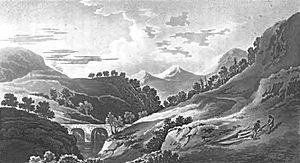Alexander Campbell (musician and writer) facts for kids
Alexander Campbell (1764–1824) was a talented Scottish musician and writer. He created many different types of works, from songs to poems and travel books.
Early Life and Education
Alexander Campbell was born in 1764 in a place called Tombea, near Loch Lubnaig in Scotland. He was the second son in his family. His father was a carpenter who faced tough times and moved the family to Edinburgh. Sadly, his father died when Alexander was only eleven years old.
His older brother, John, helped support the family. John later became well-known in Edinburgh and was a friend of the famous poet Robert Burns.
Both Alexander and John learned music from a teacher named Tenducci in Edinburgh. Tenducci helped them start their careers in music. Alexander became an organist at an Episcopalian church near Nicholson Street. He also gave singing lessons.
Some of his students included the famous writer Walter Scott and his siblings. However, the Scott children didn't enjoy music lessons much, and Alexander wasn't very patient. Walter Scott later remembered how his neighbor would ask if the boys could be disciplined at different times because the noise was "dreadful"!
Around 1785, Alexander published a collection called 'Twelve Songs set to Music'. He also had a disagreement with a local artist named Kay. Kay then drew a funny picture of Campbell in his 'Portraits' collection, showing him turning a hand organ with lots of noisy animals around.
Adult Life and Writings
Alexander Campbell married twice when he was still quite young. His second wife was the widow of Ranald Macdonald of Keppoch. Campbell thought this connection might help him get a new job. So, he stopped teaching music and began studying medicine at the University of Edinburgh.
Even though he announced a book about medicine in 1798, it seems he didn't actually work as a doctor. Instead, he focused on writing. During this time, he wrote 'Odes and Miscellaneous Poems' (published in 1796). He also made and published some drawings of the beautiful Scottish Highlands.
His next important book was 'An Introduction to the History of Poetry in Scotland' (1798). This book included many Scottish songs and was illustrated by David Allan. It shared a lot of information about poets of his time. Campbell strongly believed that the ancient poems of Ossian were real, and he wrote about that in his book.
Campbell then wrote 'A Journey from Edinburgh through parts of North Britain' (1802, with a new edition in 1811). This book included his own drawings from his travels. It gives us an interesting look at what many parts of Scotland were like in the early 1800s.
After this, he published 'The Grampians Desolate, a poem in six books' (1804). This long poem focused on the sad situation in the Scottish Highlands. He wanted to show how the growth of sheep-farming was causing problems for the people living there. A sad story in the book even led to the creation of the Edinburgh Destitute Sick Society, which helped people who were very ill and had no one to care for them.
Later, he released 'Albyn's Anthology' (2 volumes, 1816 and 1818). This was a collection of Scottish songs and poems that hadn't been published before. Campbell had planned this project since 1790. With help from famous people like Henry Mackenzie and Walter Scott, he finally made it happen. He even traveled over a thousand miles to collect materials for the book! Writers like Walter Scott and James Hogg contributed poems to it. Campbell also claimed to have written the music for a well-known song called 'Gloomy Winter's nou awa'.
Later Life
In his final years, Alexander Campbell became very poor. He mostly earned money by copying old papers for his former student, Walter Scott. Scott said that Campbell would only accept payment for the exact work he did, even from his kind patron.
Scott also told a story about a dinner where Campbell and another writer had to race for a new pair of trousers. While Scott thought the story might be exaggerated, he knew that Campbell received "many substantial benefits" from his publisher, Archibald Constable. Campbell himself wrote a letter thanking Constable for his help.
Alexander Campbell passed away on May 15, 1824, after a sudden illness. His writings, including a play that was never published, were sold after his death. Walter Scott wrote about Campbell in the 'Edinburgh Weekly Journal'. He described Campbell as a warm-hearted and talented person, though perhaps not always practical. Scott felt that while Campbell had many skills, he didn't quite reach the level of perfection that people expected from artists who needed to make a living from their work.
See Also
Images for kids
 | Bayard Rustin |
 | Jeannette Carter |
 | Jeremiah A. Brown |



